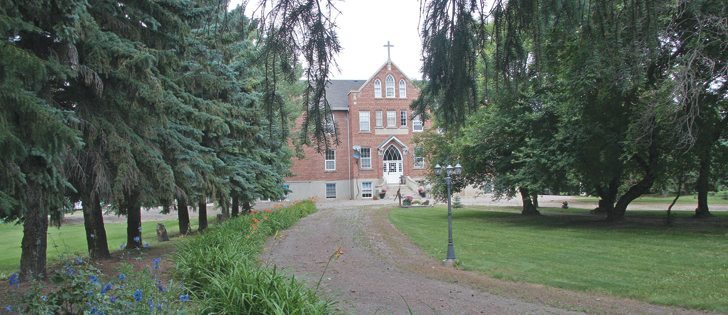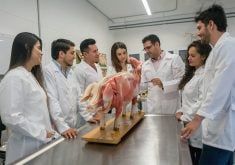LEIPZIG, Sask. — Sister Zita Merkowsky was a nun with the Sisters of Notre Dame convent in Leipzig when the towering red brick building was shuttered in 1969.
She told Ardyth Clark, the building’s current owner, that the sisters went to the chapel before they locked the doors on the Catholic boarding school.
“She said they prayed that one day this place would once again be a house of teaching and healing. That alone made me cry. She then said, ‘I waited 40 years, dear, for my prayers to be answered,’ ” said Clark.
Read Also

Fuel rebate rule change will affect taxes and AgriStability
The federal government recently announced updates to the fuel rebates that farmers have been receiving since 2019-20.
Now named the Leipzig Serenity Retreat, the building serves as an alcohol and drug addiction treatment centre offering five-week programs for more than 400 clients from across Canada and into the United States.
“It’s a little piece of heaven,” said Clark of the restored three-storey building, which was built in 1927 and sits in a six acre park-like setting.
Clark, an alcoholic who has maintained her sobriety for three decades, had long offered her former Alberta home as a place of healing for those struggling with addictions.
She, with her ex-husband, Don Clark, and master carpenter Gary Corkum, bought the old convent for $140,000 in 2008, started the extensive renovations and welcomed their first client the next year.
“People come in here with not a lot of hope. About halfway through, we see a difference in them,” said Clark, who by 32 was a full blown blackout alcoholic. Her business partners also struggled with substance abuse, as did her late brother.
“I could never help him,” she said of her sibling.
His death motivates her to put up with operating in a drafty old building that’s hot in the summer and chilly in the winter and required a $650,000 investment to get to where it is today.
Treatment at Leipzig follows the 12 step recovery program outlined in Alcoholics and Narcotics Anonymous, where only first names are used.
Bryan came for treatment before Christmas last year.
“I seen a lot, done a lot. Alcohol got in my way. I was tired of the routine I was in,” said Bryan, who heard about the centre from a family friend.
He formed a bond with the people and the place and was happy to re-turn as a maintenance worker.
“You form a close relationship with these people,” he said, noting he remains in touch with others from his time here.
Julie is back for a second round of treatment.
“Before, I wasn’t ready to quit,” she said. “This time, I’m going to quit and stay quit.”
Julie hopes to be more open about her issues.
“I’m letting go of some secrets I was not willing to talk about last time,” said the 19-year-old, who wants to return to high school.
For Kenny, alcohol was interfering with work.
“This time I’m here because I had a bad night at work and I came to save my ass again,” he said.
He’s tried other programs but prefers this one. The staff includes re-covered addicts who understand what the clients face.
“Everybody here seems to understand and is willing to listen,” said Kenny.
He credits Clark for his being here.
“Ardyth opened my eyes to why I should be here,” he said.
Housekeeper and recovered alcoholic Sherry Graham said staff and clients bond and look out for one another.
“It doesn’t have an institutional feel. It’s homey,” she said.
“If I see someone bothered, I talk to them and direct them to somebody.… There’s an atmosphere of looking after each other.”
Mental health consultant Jacklin Andrews is often called upon to work with clients and support counsellors working at Leipzig.
He said the program, which is voluntary, deals with the whole person and not just the drinking.
Most have other problems ranging from sexual abuse to bad marriages.
Some are in toxic family environments or feel guilt and anger related to broken marriages and have to adapt to life without those negative influences in their life.
“They need to know how to deal with that,” he said.
“It’s hard enough for anyone, never mind someone who is sobering up.”
Andrews advises moving away from negative family environments and getting a fresh start with support from mental health professionals and AA programs.
Andrews said the remoteness of the Leipzig site is a benefit.
“Temptation is really huge for them,” he said, noting how clients have to turn over their car keys while at the facility and have minimal contact with family.
He said Leipzig’s success rate is comparable to other programs, noting the success rate for AA is about 25 percent.
“You look at five or six guys, probably only two will be successful.”
Clark claims a much higher percent success rate at about 40 percent, noting how she keeps in touch with as many former clients as possible.
“They go home with a good understanding of how they work, they find out who they are, what they’ve done and take ownership for it,” said Clark.
The centre, which charges $10,000 for the treatment program, includes daily classroom sessions.
“It seems like a lot of money, but if you think about what it’s doing, it’s worth it,” said Andrews.
It is self-supporting and has re-ceived much support from the surrounding community in donations of furnishings and dishes. Leipzig hosts an annual concert fundraiser to support the centre.
It employs 15 staff and can accommodate up to 22 clients at a time in an assortment of bedrooms. Clark re-ceived help from her daughter, Jacqueline, who worked in office administration until July, and her daughter, Melanie, a social worker who is being groomed to take over when Clark retires.
Clients address their individual challenges while working through the 12 steps and emotional wellness classes that address life skills, self-esteem, depression and negative thoughts.
“They understand how healthy it is to get rid of this stuff,” Clark said.
“We are as sick as our secrets.”















